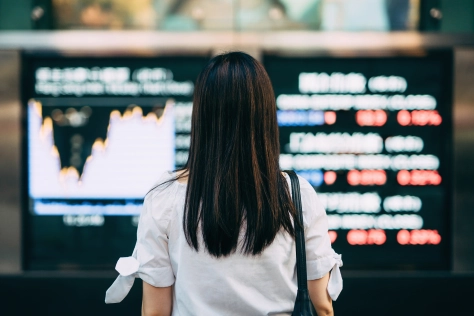
The economy & your investments
Join our Chief Economist and Chief Investment Officer as they discuss the global economy, inflation, interest rates, and the investment landscape.
How will generative AI affect the global economy?
Since the launch of ChatGPT, there has been a heated debate about the impact of AI on the economy and society. Some analysts predict huge gains in productivity and GDP growth, while others are concerned about the risks of mass lay-offs and increased inequality.
Generative AI is a type of artificial intelligence that can write a poem, compose a song, or design a logo based on input or criteria. Unlike traditional AI, which has generally focused on predicting or classifying existing data or performing specific tasks, generative AI uses algorithms to learn from data and generate something new and original.
This new technology is likely to affect all aspects of our lives, our industry (see How will AI change finance?) and the economy. The main impact will be on the labour market. On the one hand, generative AI could have an impact on employment as some jobs become redundant, on the other hand, it could increase the productivity of employees.
In a recent paper, OpenAI researchers found that generative models could affect 80% of the US workforce, with writers, web and digital designers and financial quantitative analysts among the most “exposed” professions to the new technology. It is worth noting, though, that most of the professions (~75% of the workforce) are only partially exposed, and they are likely to be complemented rather than substituted by AI.
Another robust paper on the subject examines the productivity effects of generative AI technology and finds that it raises the productivity of workers, particularly benefiting low-skilled workers. As happened in the past with the mechanisation of production during the industrial revolution, the skill premium should fall, reducing inequality.
However, the key to assessing the impact of AI on the economy is the rate of adoption. In 1997, Paul Krugman, a Nobel Prize laureate and one of the brightest economic minds of his generation, said that “The Internet’s impact on the economy has been no greater than the fax machine’s...ten years from now, the phrase 'information economy' will sound silly.” This major gaffe by a prominent economist should teach us two things. First, macroeconomists should not be trusted when it comes to making technology forecasts, and second, the impact of technology on the economy takes time to materialise.
When Krugman made this prediction the Internet was used by 20% of the American people, even though the World Wide Web was open to the public since 1991. Five years later 60% present of the US was using the internet frequently.
Historically, most companies have been slow to adopt new technologies due to a lack of skills and know-how. This time however it could be different: Open AI was used by 100 million just two months after launch, setting a new record for the fastest-growing user base.
In a model where the adoption rate is the determinant variable, Goldman Sachs estimates that generative AI models could increase global GDP by 7% (or almost $7 trillion) and boost productivity growth by 1.5 percentage points over a 10-year period.
Despite the potential for new technologies to disrupt industries and livelihoods, they could also be the key to unlocking the productivity growth we need to boost incomes and living standards. After nearly two decades of sluggish productivity growth in most advanced economies, generative AI could be the game-changer we’ve been waiting for.
Santiago Rossi, Investment Analyst
This website uses cookies.
Some of these cookies are necessary, while others help us analyse our traffic, serve advertising and deliver customised experiences for you.
For more information on the cookies we use, please refer to our Privacy Policy.
This website cannot function properly without these cookies.
Analytical cookies help us enhance our website by collecting information on its usage.
We use marketing cookies to increase the relevancy of our advertising campaigns.